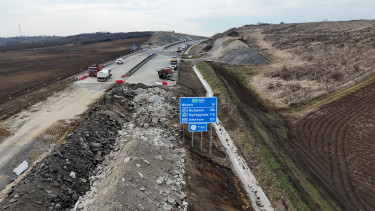Automation might open up new opportunities in Hungary

Rob Rooney has been with Morgan Stanley for 29 years, spending the majority of his career in various markets businesses. From 2013 to 2015, he led the Global Fixed Income team before becoming Chief Executive Officer of Morgan Stanley International. He was appointed Global Head of Technology in 2017, and latterly took over the Operations Division as well.
What are your plans with Morgan Stanley’s Budapest office and how does it fit in the strategy of the global financial firm?
I’ve had a close relationship with Morgan Stanley’s Budapest office since its inception in 2006, through its initial focus on fixed income. Today, Technology is one of the office’s top priorities.
As a global financial firm, Morgan Stanley is simultaneously an investment bank, a wealth manager and an investment manager. To be able to do those things at the level we do them, and to be global in all of those businesses, which we are, we need a really serious and best-in-class tech division with 24/7 availability. Budapest offers a high-tech location – ideally situated from a time-zone perspective. The finance work, risk functions and operations we do here are also highly complex. We are classified as a Global Systemically Important Financial Institution, and as such, we have to be stress-tested continuously.
Budapest offers an excellent talent pool to perform all the required tasks and we have a terrific culture here, it is an important part of the global Morgan Stanley infrastructure.
Morgan Stanley has recently started to work with other American financial institutions to develop the Hungarian labour market. The initiative is backed by the American Chamber of Commerce. What are the results yielded so far by the U.S. Financial Institutions in Hungary cooperation?
On many levels, we are in competition with these financial firms, but when you step back and think about it, you’ll realize that it is our common interest to be part of a thriving market eco-system. It’s not enough for us that Budapest be a tech hub or a quantitative hub, we need it to be increasingly a financial services hub capable of attracting top talents in related fields.
It used to be the case for a university graduate that they needed to go to London or New York to have a successful career in finance. Today, Budapest also offers career perspectives with a real impact on a variety of day-to-day operations of a global financial firm. We’ve reached the point where we do not only hire locally but we also have to make sure we attract the right talent to come to Budapest from other markets.
Fintechs have recently started to tone down their anti-bank rhetoric and are simultaneously becoming more open to cooperation with traditional financial institutions. What kind of fintechs does Morgan Stanely work with in the region?
Large financial institutions like us work with all types of fintechs when it comes to providing digital services. Our most active business in this field is Wealth Management in North America. They have a lot of partnerships with local and international fintechs as well.
Existing and new fintechs here in Europe can potentially help us with all our businesses, for instance with trading activities, cybersecurity or settling trades. These partnerships are mutually beneficial: banks have significant customer franchises and brands, whereas fintech offers innovative greenfield technologies that can save costs and drive new product and services offerings.
It took Morgan Stanley 85 years to build its market-leading brand and no single fintech is going to replicate that any time soon. We’re well aware that some of our tech is aging rapidly and we’re very active in assessing whether the best way to develop future functionality for our clients is to buy, build or partner as the best path to execution.
How do new, digital payment systems and tools change the daily lives of customers and banks?
There are several app-based providers on the consumer side working on this and then there are alternative payment solutions such as PayPal, Venmo or Zelle, the latter of which is a fintech that Morgan Stanley partnered with. These are payment apps that make our daily lives incredibly convenient and I am sure there will be many more like them. This market, by the way, is really competitive, in fact, it could be argued that it is getting overcrowded.
International payments is an area still waiting to be cracked, although there are a few companies that say they have. This is where digital currencies and distributed ledger technologies might result in a breakthrough in the future. In collaboration with partners in the industry, Morgan Stanley is actively exploring ways to make international payments faster, safer and cheaper. There won’t be one bank that suddenly finds a solution, as the whole network has to be revolutionized, whether it’s through Blockchain or through a combination of other emerging technologies and standards.
What other areas can you apply Blockchain to? For instance, do you see cryptocurrencies becoming widespread?
I believe Blockchain is a revolutionary technology that will eventually create value in the financial sector, the issue is we don’t yet see the exact areas where it can offer new approaches. I think there are lots of Blockchain solutions out there, but it’s more difficult to find concrete problems that need solving. We are invested in Blockchain research, but I wouldn’t put it on the top of our priorities right now.
What technologies can bring radical change in the financial sector beyond Blockchain?
Artificial intelligence and machine learning, without a doubt. They are already in the process of revolutionizing a lot of things we do like analysing risk, automation and analytics, to identify patterns or outliers in a system.
Then there is the cloud, which is truly transformative. All the best tech, all the best development toolkits are in the cloud. The cloud offers high levels of processing speed, and protection that can’t be replicated by any other tool. Importantly, for a global business like ours, the cloud means you only have to pay for the things you use.
What effect will automation have on Morgan Stanley’s Budapest office?
I think Morgan Stanley’s Budapest office is a big winner in the acceleration of automation. This is because the team in Budapest is doing so much of the automation itself, in fact, our colleagues here are at the forefront of many automation processes and initiatives.
Automation makes it a lot more efficient and economical to run Morgan Stanley, it raises our level of precision, and it makes the movement of money much safer. It’s a win-win situation. Employees whose work is directly affected by automation will be able to help us by performing much more interesting and value-added functions.
What tools does Morgan Stanley use to defend itself against intrusions in cyberspace?
All of them. You can never be overconfident when it comes to cybersecurity, you always have to be ready for another attack. The bad guys are getting faster and smarter every day. We use a host of cybersecurity tools from third parties, and many tools we build ourselves.
For example, we protect our perimeter, but we’re also looking for people that may have breached it and are moving laterally in the system to try and find something of value.
A lot of people would like certain processes to be faster in the firm’s IT systems and spend less time on things such as access management, but this would be equivalent to leaving the door of our homes open to be able to move in and out faster, ignoring the fact that unauthorized people may also enter.
In the wake of GDPR and other privacy measures, do you expect data protection authorities in the Western world to come up with even more stricter regulation?
I do expect tighter regulation, but we are supportive of the trend as data protection is important. We think that the regulation is in the right spirit, whether it is perfect or not.
Data protection itself is not the biggest challenge. What becomes a challenge is regulatory inconsistency - when regulators in different parts of the world come up with different regulatory frameworks. You might read nowadays about globalization pulling back, but the reality is it is still a growing phenomenon, and that includes the free flow of data. Regulatory inconsistency makes that really challenging.
I don’t have an easy solution to this problem, and I don’t want to be critical of regulators, but it remains a challenge to comply with different regulations while providing access to global markets at the same time.










